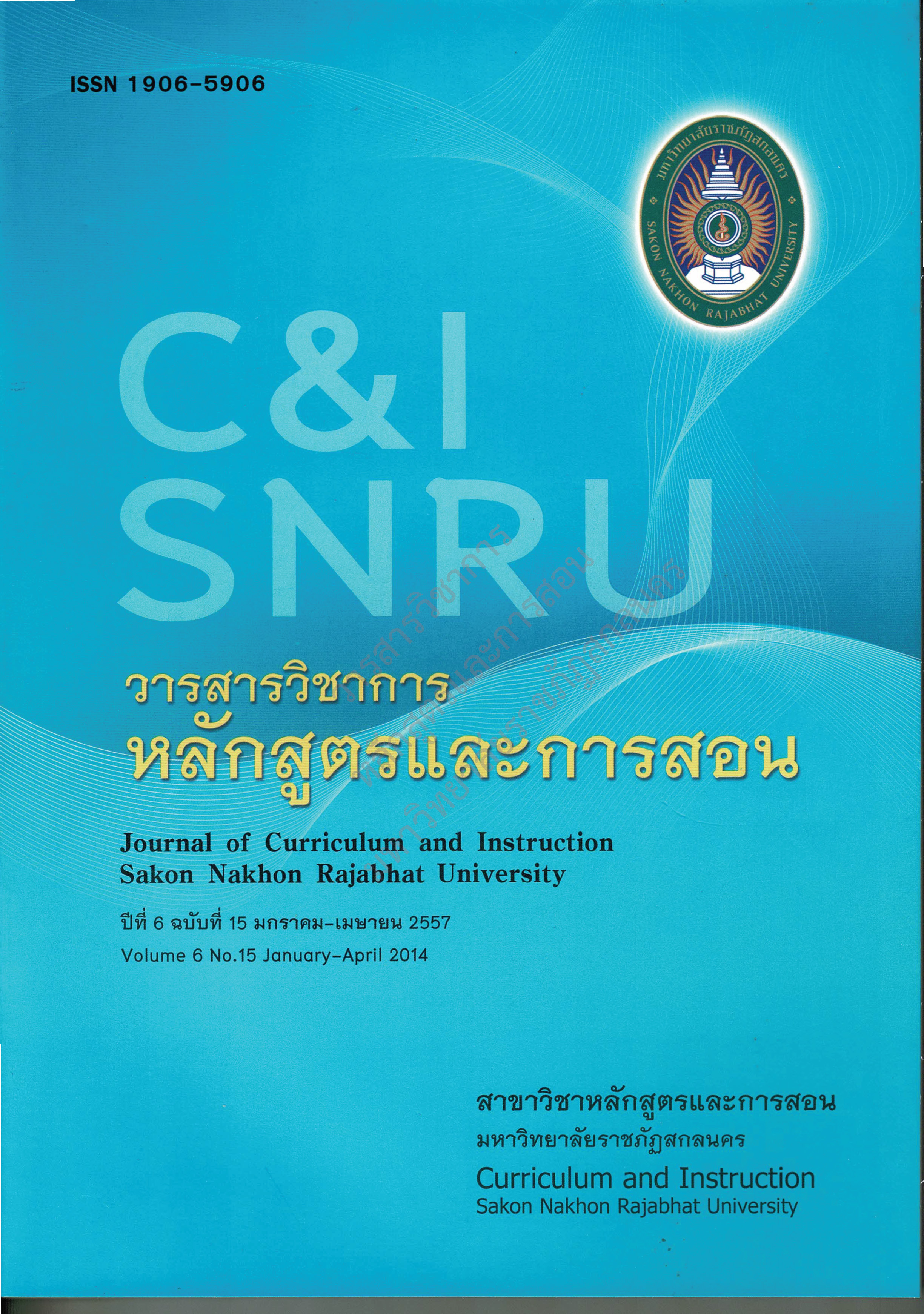


บทคัดย่อ
การวิจัยครั้งนี้มีความมุ่งหมายเพื่อ (1) พัฒนากิจกรรมการเรียนการสอนคณิตศาสตร์ตามทฤษฎีพหุปัญญา เรื่องบทประยุกต์ ชั้นประถมศึกษาปีที่ 6 (2) ศึกษาประสิทธิภาพของกิจกรรมการเรียนการสอนตามทฤษฎีพหุปัญญา เรื่องบทประยุกต์ ชั้นประถมศึกษาปีที่ 6 ให้มีประสิทธิภาพตามเกณฑ์ 75/75 (3) เปรียบเทียบผลสัมฤทธิ์ทางการเรียนของนักเรียนก่อนเรียนและหลังเรียนด้วยกิจกรรมการเรียนการสอนคณิตศาสตร์ตามทฤษฎีพหุปัญญา เรื่องบทประยุกต์ ชั้นประถมศึกษาปีที่ 6 (4) เปรียบเทียบเจตคติต่อการเรียนคณิตศาสตร์ของนักเรียนชั้นประถมศึกษาปีที่ 6 ที่เรียนด้วยกิจกรรมการเรียนการสอนตามทฤษฎีพหุปัญญา เรื่องบทประยุกต์ระหว่างก่อนเรียนและหลังเรียน กลุ่มตัวอย่างที่ใช้ในการวิจัยครั้งนี้ คือ นักเรียนชั้นประถมศึกษาปีที่ 6 ภาคเรียนที่ 2 ปีการศึกษา 2554 โรงเรียนบ้านแร่ สำนักงานเขตพื้นที่การศึกษาสกลนครประถมศึกษาเขต 2 จำนวน 30 คน ได้มาโดยการสุ่มแบบกลุ่ม (Cluster Random Sampling) และการวิจัยครั้งนี้ใช้แบบแผนการวิจัย One Group Pretest Posttest Design
เครื่องมือที่ใช้ในการวิจัย ประกอบด้วย (1) แผนการจัดการเรียนรู้คณิตศาสตร์ ชั้นประถมศึกษาปีที่ 6 เรื่องบทประยุกต์ โดยจัดกิจกรรมการเรียนรู้ตามทฤษฎีพหุปัญญา จำนวน 19 แผน (2) แบบทดสอบวัดผลสัมฤทธิ์ทางการเรียนคณิตศาสตร์ ที่มีค่าความเชื่อมั่นเท่ากับ 0.84 (3) แบบวัดเจตคติต่อการเรียนคณิตศาสตร์ ของนักเรียนที่มีค่าความเชื่อมั่นเท่ากับ 0.97 (4) แบบสังเกตการพัฒนาพหุปัญญาของนักเรียน สถิติที่ใช้ในการวิเคราะห์ข้อมูล คือ ค่าร้อยละ ค่าเฉลี่ย ส่วนเบี่ยงเบนมาตรฐาน และการทดสอบค่าที (t–test Dependent Samples)
ผลการวิจัยปรากฏดังนี้
1. การพัฒนากิจกรรมการเรียนการสอนคณิตศาสตร์ตามทฤษฎีพหุปัญญา เรื่องบทประยุกต์ ชั้นประถมศึกษาปีที่ 6 ได้แผนการจัดการเรียนรู้ โดยผู้เชี่ยวชาญเป็นผู้ตรวจสอบ พบว่ามีลักษณะและองค์ประกอบเหมาะสมสามารถนำไปใช้ได้
2. กิจกรรมการเรียนการสอนคณิตศาสตร์ตามทฤษฎีพหุปัญญา เรื่องบทประยุกต์ ชั้นประถมศึกษาปีที่ 6 มีประสิทธิภาพเท่ากับ 79.50/78.22 สูงกว่าเกณฑ์ 75/75 ที่ตั้งไว้
3. ผลสัมฤทธิ์ทางการเรียนของนักเรียนชั้นประถมศึกษาปีที่ 6 ที่ได้เรียนด้วยกิจกรรมการเรียนการสอนคณิตศาสตร์ตามทฤษฎีพหุปัญญา เรื่องบทประยุกต์ หลังเรียนสูงกว่าก่อนเรียน อย่างมีนัยสำคัญทางสถิติที่ระดับ .01
4. นักเรียนชั้นประถมศึกษาปีที่ 6 ที่เรียนด้วยกิจกรรมการเรียนการสอนคณิตศาสตร์ตามทฤษฎีพหุปัญญา เรื่องบทประยุกต์ มีเจตคติต่อการเรียนคณิตศาสตร์หลังเรียนสูงกว่าก่อนเรียน อย่างมีนัยสำคัญทางสถิติที่ระดับ .01
5. ผลการพัฒนาพหุปัญญาของนักเรียนที่เรียนด้วยกิจกรรมการเรียนการสอนคณิตศาสตร์ตามทฤษฎีพหุปัญญา เรื่องบทประยุกต์ หลังเรียนความสามารถทางพหุปัญญาทุกด้านมีการเปลี่ยนแปลงไปในทางที่ดีขึ้น คะแนนระดับคุณภาพเฉลี่ยโดยรวมอยู่ในระดับมาก มีค่าเฉลี่ยเท่ากับ 3.46
Abstract
The purposes of this research were : (1) to develop of the mathematics learning activity based on the theory of Multiple Intelligences entitled “Application” for Prathom Suksa 6, (2) to find out the effectiveness of the mathematics learning activity based on the theory of Multiple Intelligences entitled “Application” for Prathom Suksa 6 to achieve the efficiency of 75/75, (3) to compare the achievement of the Pre - Learning with the Post – learning after using the learning activity based on the theory of Multiple Intelligences entitled “Application” for Prathom Suksa 6, (4) to compare attitudes towards learning after using the learning activity based on the theory of Multiple Intelligences entitled “Application” for Prathom Suksa 6. The subjects of this study were 30 Prathom Suksa 6 students in the second semester of the academic year 2011, at Ban Rae school, under the Office of Sakon Nakhon Prathom Suksa Educational Service Area 2. These students were selected by cluster random sampling and One Group Pretest Posttest Design was used.
The instruments used in this research consisted of : (1) 19 lesson plans of the Mathematics learning activity based on the theory of Multiple Intelligences entitled “Application” for Prathom Suksa 6,(2) the achievement test with the reliability index of 0.84 , (3) an attitude test towards learning after using the learning activity based on the theory of Multiple Intelligences entitled “Application” for Prathom Suksa 6 with the reliability index of 0.97. The data were analyzed by using percentage, arithmetic mean, standard deviation, and t – test (Dependent Samples).
Research findings were as follows :
1. The lesson plans features of the learning activity development based on the theory of Multiple Intelligences entitled “Application” for Prathom Suksa 6, examined by the experts, were appropriate to be used.
2. The efficiency of the learning activity based on the theory of Multiple Intelligences entitled “Application” for Prathom Suksa 6 was 79.50/78.22, which was higher than the criterion of 75/75.
3. The achievement of the experimental group after learning through the learning activity based on the theory of Multiple Intelligences entitled “Application” for Prathom Suksa 6 indicated that the posttest scores were higher than the pretest scores at the .01 level of significance.
4. The posttest average score of attitude toward mathematics learning of the students learning through the learning activity based on theory of Multiple Intelligences were higher than those of their pretests at the .01 level of significance.
5. The effects of students’ Multiple Intelligences development after learning through mathematics learning activity based on the theory of Multiple Intelligences entitled “Application” were found that their Multiple Intelligences abilities changing in the better way. The average score of quality, as a whole, was at the high level of 3.46.
คำสำคัญ
กิจกรรมการเรียนการสอนคณิตศาสตร์, ทฤษฎีพหุปัญญาKeyword
Mathematics learning activity, Theory of Multiple Intelligencesกำลังออนไลน์: 19
วันนี้: 676
เมื่อวานนี้: 951
จำนวนครั้งการเข้าชม: 1,132,229
อาคารบัณฑิตวิทยาลัย ชั้น 3 เลขที 680 หมู่ที่ 11 ตำบลธาตุเชิงชุม อำเภอเมือง จังหวัดสกลนคร 47000 โทรศัพท์/ โทรสาร 0-4297-0033
บรรณาธิการ: รองศาสตราจารย์ ดร.สำราญ กำจัดภัย
ติดต่อ/สอบถาม: นางสาวศิวาภรณ์ เก่งสุวรรณ์
โทร: 0-4297-0033